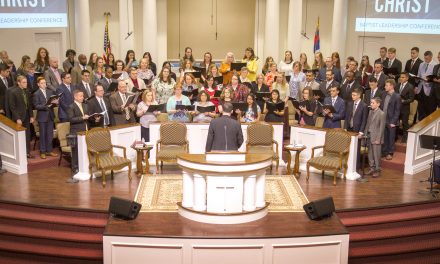Proverbs 4:23, “Keep thy heart with all diligence; for out of it are the issues of life.”
Music is an amazingly powerful thing. It has been known to repair brain damage; cause or prevent seizures; affect the heartbeat, pulse rate, and blood pressure; change moods, and even affect our shopping practices.
Music can be used properly or improperly. It can be very effective in preparing hearts or it can be extremely dangerous in distancing hearts.
It has often been said that one of the first things to change a church is its music.
Many independent, fundamental Baptist churches have begun a downward slide starting with their music program.
Therefore, it is vital that we “keep the heart” / guard the heart of our church music programs.
Guarding the heart of your church must be done with diligence.
It must be watched over, guarded, and protected.
Just as “a child left to himself bringeth his mother to shame” so does a music program that is not watched over, guarded, and protected.
Anything that is to be guarded must be done so on purpose. It cannot be something that is done nonchalantly.
One of the best ways to guard something is by planning or organizing a way to do so.
Below are some thoughts on organizing your church music program so as to be able to guard its heart and direction:
- Make sure that your church music program has the right foundation.
- Without the right foundation, everything else that you build upon it will crumble.
- A foundation built on Scripture.
- A music foundation that gives the Pastor total authority over the program.
- Initially, the Music Program can be overseen directly by the Pastor. As your church grows, it may be wise to assign someone this position.
- The Pastor can delegate someone he trusts to be over the music program. This could be a “Music Director,” “Music Coordinator,” or another staff member.
- The person delegated to this task should be chosen very carefully. This person should have the following character traits:
- Loyalty to Scriptural music guidelines.
- Loyalty to the Pastor and his leadership.
- Nothing can hurt more than for a music director (or any staff member for that matter) to be disloyal to his pastor and church. Since music is so powerful, it would be very easy for this person to lead the church folks away from Scriptural teaching and the Pastor’s direction through the influence of music.
- Good people skills. The music director/coordinator will have to deal with personal issues as well as music issues.
- This person should have a meeting with the Pastor on a consistent basis. Whether it is monthly, biweekly, or weekly. This allows several things to take place:
- This allows the pastor a scheduled time to share his philosophy, thoughts, praise, or concern about the church music program and /or its events.
- This allows the one in charge of the music program to seek the Pastor’s advice on how he wants issues cared for. After all, humanly speaking it is his church and not the music director’s!
- Create a set of church policies and requirements that must be agreed upon by individuals in order to become a part of the church music program. Things such as:
- Church membership (salvation & baptism)
- Faithful church attendance (Sunday AM, PM, & Wednesday PM)
- Tithing
- Soul Winning (attendance to at least one of the weekly Soul Winning meetings)
- Dress standards
- Loyalty to the Pastor and Church
- Encourage all those who have a desire to be in the church music program to be in the choir.
- The choir is typically where most music philosophies are taught and explained.
- Some folks may not be quite ready for a solo, duet, trio, or ensemble, but they could be very valuable in the choir!
- The choir should be the “founding father” of all music groups!
- The choir is typically led by the music director / the one overseeing the entire church music program. This allows time for those involved in the music program to get to know the heart of the music director and the Pastor.
- When creating music groups, assign a group leader in each group. This helps the group to know who is in charge. It also gives you a person who is responsible for the group should something need to be addressed.
- When creating music groups, also assign a pianist to that group. Having the same pianist is a blessing to a singing group.
- Have periodic meetings with those in the church music program.
- These could be annually, quarterly, or monthly – whatever the need may be.
- Your meeting could be with a different group each meeting. For instance, one time you could meet with everyone in the entire church music program. Another time, you could meet with all of your group leaders. Another time, you could meet with all of your accompanists. Basically, set it up for whatever the need may be, but do so in advance.
- Express gratitude in these meetings, but also use this time to address things that may need improved upon or corrected.
- If you are having some trouble with a particular group or group leader, do not hesitate to call them in and talk to them privately. Don’t let the problem grow!
- Require that all music sung at your church go through an approval process. No special music should be sung without going through this process.
ministrysharing.com

Dr. Kacy Palmore
Music & Business
Parkside Baptist Church
Mesquite, Texas







